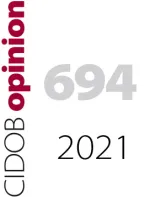Migration as coercion

*This article was previously published in La Vanguardia
The Belarusian regime has orchestrated the arrival of thousands of refugees at the borders of Poland, Latvia and Lithuania. It is not the first time one of the European Union’s neighbours has used migration as a weapon of political warfare. What these states seek in return is one question, but we must also ask how the European Union has managed to bring this on itself by creating external dependency in its border control and by giving in to its fears.
The use of migration as a political weapon is becoming more common at the European Union’s external borders. In February 2020, the Turkish government sent over 13,000 people to the Greek border. Over two days in May 2021, Morocco allowed over 10,000 to make irregular crossings into Ceuta. Now it is the turn of the Belarusian regime, which has for months been assisting thousands of people to reach the Polish, Latvian and Lithuanian borders in retaliation for the sanctions imposed by the EU.
Using migration for political ends is not new. The American political scientist Kelly M. Greenhill calls the deployment of migration as a tool of political and military warfare the "weaponisation of migration". Taking a long-term historical perspective, Greenhill distinguishes between coercive intentions, where migration is used as a foreign policy tool for applying pressure on other states; dispossessive intentions, where the aim is to annex certain territories or consolidate power; and economic motivations, where the goal is financial gain.
The intentions of Turkey, Morocco and now Belarus are clearly coercive: they have instrumentalised migration in order to induce change and obtain concessions from the EU. Turkish President Recep Tayyip Erdoğan sought increased financial aid for hosting refugees and support for Turkish military operations in northern Syria. Morocco was responding to the hospitalisation in Logroño of Brahim Ghali, leader of the Polisario Front, which it saw as disloyal, and ultimately demanded collusion on the issue of Moroccan sovereignty in Western Sahara. Now Belarus, with Russian backing, is pressuring the EU not to meddle in its internal affairs.
The EU is aghast at these instances of “blackmail”. On the one hand, it describes the arrival of thousands of people (including families and minors) as a serious “security” threat and, as such, has no hesitation in declaring itself “at war”, with consequent effects on its language and the deployment of national armies at the border. On the other hand, it blanches at the “indecent” and “cynical” use of refugees for political purposes. It responds with force and a rarely seen unity without realising that, deep down, it is a victim of little more than its own actions. This is true in multiple ways.
First, the EU overreacts. Because it fears nothing so much as another “migration crisis”, the blackmail is guaranteed to succeed. The number of people is not what counts, in the end. What counts is fear: part of the electorate’s fear of migrants, and governments’ fears of the division and chaos the EU and the member states exhibit on each occasion.
Second, the use of migration as a political tool is a direct consequence of the outsourcing policies promoted by the EU and the member states. By forcing neighbouring states to control our borders, we automatically place ourselves in their hands. We offer incentives in exchange for this control, from development assistance funds to potential trade and visa agreements. Now, they are the ones looking to impose their conditions.
Third, this is not merely a question of migrants and refugees falling into a trap set by malicious governments. The states may facilitate their arrival, but they are not the reason people come. Chronic poverty and conflict are what make refugees “cannon fodder” for this state machine. In spite of the evidence, the EU’s main aim is to “raise awareness” among migrants. It prefers to blame foreign governments for taking advantage of migrants’ naivety than to recognise that the cause is at origin and that the solution is to provide protection and decent living conditions.
Fourth, declarations of war open the door to exception. States of emergency, such as those declared in Poland and Lithuania, tend to bring suspensions of fundamental rights, unlimited use of force by the army and the militarisation of large areas to which the press and NGOs are denied access. This is nothing new. This is what happened in Greece and push-backs, which violate national and EU laws, are a constant on each occasion.
Ultimately, as Ivan Krastev points out in After Europe (2017), migration crises may well end up signifying the beginning of the end of European liberalism, not because of what they are but because of what they produce. Since 2015, our fear of another migration crisis has made us willing to accept the unacceptable. And this is the real problem: externally, we have become hostages (and therefore mute) in the face of pressure from third states; internally, we have ended up accepting the violation of fundamental rights. Worst of all, no one seems troubled by it anymore.
Keywords: migrations, EU, refugees, Belarus, Poland, Lithuania, Latvia, externalisation, blackmail, Turkey, Morocco
E-ISSN: 2014-0843